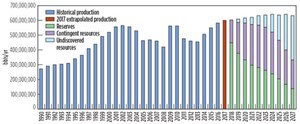What's new in exploration
Once upon a time, folks argued how many angels can dance on the head of a pin [answer, 0.0], or in the 1950’s about how many people can fit in a phone booth [answer, 7], or in the early 2000s about how many boe of oil remained in the GOM [answer, 50 Bboe; “economic” IOR/EUR, circa 2006, MMS]. Today, they argue about how oil and gas will go out of business, replaced in total by green energy, such as wind and solar [answer, never].
Climate regulation. Global warming has been a geologic fact since the beginning—get over it. On day one, the temperature was 2,300 Kelvin—vs. the temp today? Global warming, by recent geologic standards, made possible the retreat of glaciers near Chicago, Glasgow, Mount Kilimanjaro and Bariloche, Argentina. Politically correct “climate change” is double-speak for demonizing oil and gas—simply that. The language is designed to confuse legislatures between pollution fears and climate disaster. A deafening roar from the left is a distraction from the facts. Air is generally cleaner, except over Beijing, Mexico City, Moscow, Paris and Los Angeles. Those who present alternate ideas with facts are shouted down. Why is that? I suggest power and money [theirs, yours].

Most oil and gas regulations affecting exploration are a result of popularly elected politicians, not scientists. I remind us that we all live on the planet and have adapted to slow planetary change. The last major CO2 content in the atmosphere, the Cretaceous, still allowed mammals to exist, but provided organic growth resulting in today’s hydrocarbon reservoirs. Except where air pollution is killing plants, any recently measured increase in CO2 will result in plant growth. Okay, buy an electric lawn mower for your green contribution.
Majors’ reaction. With the constant drumbeat of global regulations, and “acceptable” offshore exploration areas such as the GOM or Dutch North Sea being depleted, is it any surprise what big oil is doing? “U.S. energy companies plan to spend $2.4 billion in Equatorial Guinea to increase oil production and drill 11 wells next year,” a source is quoted as saying in a Nov. 5 Reuters story. The story continued, “ExxonMobil, Kosmos Energy, Marathon Oil and Noble Energy are among the companies likely to invest in the central African country, which required at least a $2 billion commitment before extending oil licenses, and will start an oil and natural gas exploration bidding round in April.” A very similar Bloomberg story corroborated the figures cited in the Reuters text, and added the fact that in 2017, foreign direct investment across all industries in Equatorial Guinea was a mere $304 million, according to United Nations data.
I note that ExxonMobil is leaving the GOM. Chevron is dropping $4.3 billion at Tengiz field in Kazakhstan, while reserving $1.3 billion of $7.3 billion in upstream capex for global exploration. While $1.3 billion is not a small number, it is down from what used to be $4 billion per annum. I keep telling myself that any drilling is good, even if the geo’s get the dregs.
The science of it. Please note that science took a long time to confirm what cartographers suspicioned about South America and Africa “fitting” together. We know that the Amazon once flowed to the Pacific, and that the Cretaceous saw the great break-up of the continental plates. We still know so little about the kerogen supply related to that event, and what occurred since.
Research at one of my alma mater oil companies indicated that no liquid oil is more than one million years old. Therefore, we know almost nothing about where those carbons were or how they moved over the last 145 million years. More recent attempts to reconstruct the oil-important pre-breakup world are encouraging (E. E. Williams, “Equatorial Guinea and northern Gabon margins: Regional tectonic evolution based on integrated analysis of seismic reflection and potential field data and modeling,” MS thesis, University of Oslo, 2008).
Ever since M. King Hubbard’s notable prediction [1956], every estimate of remaining recoverable reserves has been wrong. George Mitchell’s crew showed us that we need a better definition of recoverable. What else do we not know about the earth, or yet-to-be technology that will help us, assuming we can handle politics? Government cannot solve everything.
U.S. regulation controls about how many cows can be transported per square foot of vehicle trailer space, so that animals will not be bruised or anxious. Seriously. No such rule exists for people inside U.S. airplanes. We have lost sight of who we are. ![]()

- From injection to insight: Tracing efficiency in surfactant huff and puff (November 2025)
- Maximizing production with smarter lift solutions (November 2025)
- Production technology: How a minor instrument upgrade led to major oil separator savings (November 2025)
- Engineered components are the difference between survival and failure in HPHT subsea systems (November 2025)
- First Oil: A grand plan designed for U.S. offshore leasing (November 2025)


